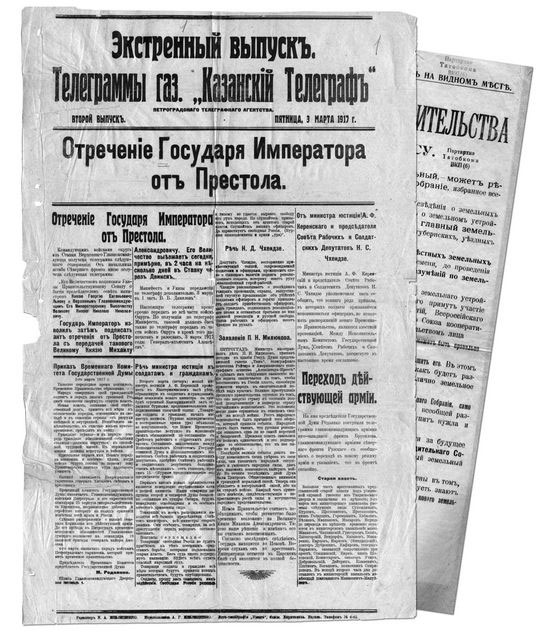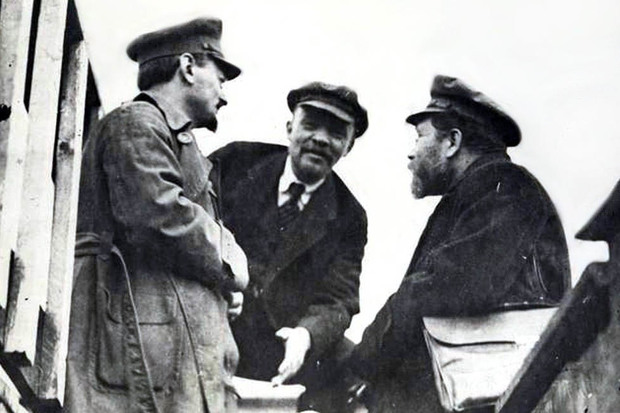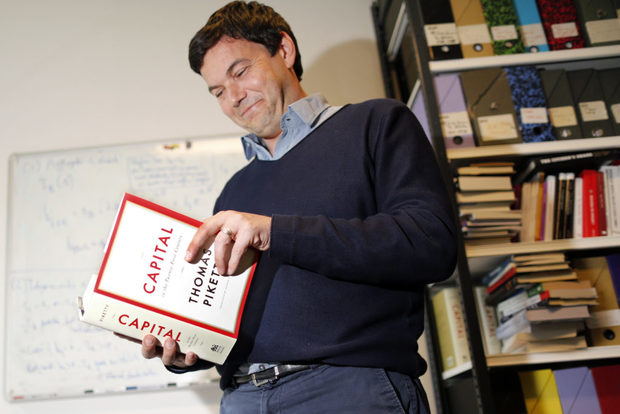Boris Kagarlitsky: ''Lenin was a genius politician just because he urged to something that did not exist''
Soviet dissident about the results of the February Revolution and why Russia is the freest country in the world
The February Bourgeois Democratic Revolution that prepared Russia for the October one took place one hundred years ago – on 8 March (O.S. 27 February) 1917. In an interview to a correspondent of Realnoe Vremya, political expert Boris Kagarlitsky who is famous for his leftist views told how the Bolsheviks used the fruits of the February Revolution, why the Left is taking a step back in the West and a possibility of a new revolution in our country.
''If Russia becomes more democratic, it will be in more serious conflict with the West than now''
Mr Kagarlitsky, in the Soviet era, the February Revolution was separated from the October one. Now the opinion that these are two stages of one revolution is dominating. What position is closer to you?
From a historical perspective, the division of the February and October Revolutions was artificial. This division reflected political stages where this process took place. Even very Soviet historians did not deny that the February Revolution prepared the October one – in a technical, social and everyday sense because it originated from the February events. It is funny to presuppose that there were two revolutions in one year. Actually two stages of the same process are meant. It is clear why they were separated.
First of all, during the very revolution, participants of the events opposed to each other at times. The same thing happened during the French Revolution.

''It is funny to presuppose that there were two revolutions in one year. Actually two stages of the same process are meant. It is clear why they were separated.'' Photo: archive.gov.tatarstan.ru
I think that in this case the division of one revolution into two is quite natural within the political logic of the participants of the process. Of course, it doesn't have any sense as a historical definition. For this reason, there is historical science to generalise and arrange the post factum of the events that the participants did not thoroughly understand, to limit it within the general concept and general logic. This is why it is correct to tell about the Great Russian Revolution. This new concept, which is being introduced, is absolutely correct. Another question is that the concept of the October Revolution as a separate event can not be eliminated from the ideological discourse. If we speak about the Left (socialists, communists, etc.), it will remain like an ideological image, not a historical occurrence.
Western historian Richard Pipes thinks that it is impossible to rule Russia democratically. Kerensky made an attempt but failed. And we did not manage to do it in 1991…
Strictly speaking, it impossible to rule democratically any country basing on similar criteria because the democracy we knew in the 20 th century is a new product. Even if we speak about the countries that are meant to be examples of democracy – Great Britain and the United States – modern democratic institutions appeared there quite late, almost in the 17th or 19th centuries. If universal suffrage is considered a compulsory condition of democracy, it became universal only in the 20th century.
Was America a democracy in the 18 th century or before the Civil War? No, of course. Because it did not have civil rights for women and black people. It is impossible to have a democracy with slavery. It was a liberal state that respected certain liberties of citizens. In this respect, in today's Russia, there is as much democracy and liberty as it was in America in the 19th century. We can't say Russia is not a free country because Russia is the freest country in the world. One can just not to obey laws, don't pay attention to them and live as one wishes. In this respect, Russia is a freer country, of course, than, for instance, Sweden.
I always cite with great joy a letter of English inspectors who came to see how the Moscow company worked under Ivan the Terrible. They wrote a report in the late 16 th century. They came to a conclusion that in that free country (Russia), English merchants completely rot because there was much freedom, which led to their degradation. For English merchants in Moscow, those times were super liberal when one could do any thing. Inspectors wrote about complete immorality, people lived as they wished, drank alcohol, built stone mansions on company's money that were absent even in the centre of London, kept beers in the yard, etc. – total freedom. Nothing like this was possible in England. So everything is very relative.

''Lenin was a genius politician just because he understood the logic of the process (and Troitsky less) and acted to take the lead – he urged to something that did not exist.'' Photo:socialistparty.org.uk
So within the existing model, a full-fledged democratic system can't be declared in Russia because the transition to a full-fledged democratic system will lead to the crash of the neoliberal democratic model. By the way, if Russia becomes more democratic, it will be in more serious conflict with the West than now. In this case, it will be necessary to pay attention to the public opinion, which is far more anti-Western. This is why, the western discourse that presupposes that Russia is anti-democratic by its nature and anti-Western because it's anti-democratic is completely demagogic and incompetent. On the other hand, we see a degradation of democratic institutions in the West. It is a topic that became banal even for very European opinion journalism. There is nothing to prove here. If earlier there were discourses of some leftists who just criticised covered bourgeois non-democracy, now it became clear democratic institutions are undermined, they are substituted by a direct bureaucratic administration from Brussels, banks, dictate of the bureaucratic apparatus, etc. That liberal bourgeois democracy that we saw in its best examples existed for a little time – between 1945 and 2005 years – in the majority of European countries. What will happen as a result of the crisis is another question. Some new democracy that will be different from the previous one no less than modern republics from the Venice democracy of the 16 th century might appear. There are some general democratic principles that need to be followed and protected, but they got a different embodiment. I think Russia can have a democratic future, but it depends on changes of the economic system. And, of course, there can't be any liberal democracy.
Why did the Bolsheviks win in 1917, though it seemed that initially the Cadets and the SRs were popular?
The Bolsheviks just understood better than others what the country needed at that moment. By the way, look at those forces that were popular on the eve of the revolution, they are destroyed by the very revolution if it is a real revolution. Why? Because radicalisation of the society is under way. Moreover, the society changes the views of what is allowed and what is not. Let's us imagine you have a tsarist regime, a sound person understands that obtaining some constitution that will limit the tsar's rights a bit is the maximum. Then all of a sudden the tsar was toppled, he doesn't exist! You perfectly understand that the horizon changed its position. And those political leaders who seemed to you realists and sound-minded progressive chiefs just several hours ago now seem to be people of the past. The programme was not just done, it fell behind a long time ago. The public development has a faster pace than these political programmes and political parties, that is to say, they always fall behind. At one moment, the most radical forces come to power. They not only have the most radical mottos within the understanding of the logic of the processes and what the next task is. They need to work to be ahead. Other parties fell behind. Lenin was a genius politician just because he understood the logic of the process (and Troitsky less) and acted to take the lead – he urged to something that did not exist. Others worked with ideas formed 1-3 years ago in a pre-revolutionary period, which is an era.
''The Left doesn't try to reform the existing system but protect it, what is more, from workers''
By the way, as for Europe. Mr Kagarlitsky, why is the Left in the West losing its initial importance? Did it care for the rights of gays or cats instead of fighting for the rights of workers and social benefits?
Because the Left became part of the liberal establishment. Traditional leftist parties were bribed, integrated and spoiled having become, in fact, part of the liberal elite, establishment. Together with the liberal Right, they became guardians of the Brussels bureaucracy and financial capital. By the way, it is seen even in programmes that are supposed to be radical. For instance, Thomas Piketty (Editor's Note: Thomas Piketty is a French economist who studies wealth inequality) offers to increase taxes to get more money to the state budget in order to correspond to the European Central Bank's requirements. This is all radicalism – to meet interests of the European Central Bank and the financial capital more effectively and that's it! In other words, to make the local bourgeoisie, including industrial, pay the bank more. This is the concept that is presented as a fight for social justice and Capital in the Twenty-First Century. This is anecdotic. Piketty's views of a tax reform that will lead to total equality are absolutely wrong because one tax reform doesn't change the social structure. It can be a tool to change the social structure if you mean the corresponding strategy in general. If you carry out a tax reform conserving this social structure, it either fails or works to reproduce this structure in some different conditions.

''Thomas Piketty (photo) offers to increase taxes to get more money to the state budget in order to correspond to the European Central Bank's requirements. This is all radicalism – to meet interests of the European Central Bank and the financial capital more effectively and that's it!'' Photo: businessinsider.com
Or what Benoît Hamon (Editor's Note: a French politician, socialist) is offering now – the so-called basic income. It is another attempt to undermine the social state, relieve the state of the responsibility to provide occupation, consequently, monetise all these social processes and, in turn, increase the dependence of the population on banks and other structures that manage finance. That is to say, the Left actually performs a role of an agency of the financial capital. So it refused its role, its social base.
This Left is doomed to historically death with the neoliberal system. It will be substituted by other leftist movements sooner or later like the First International, Second International and the communist movement. It is also quite natural that it must regularly renew. So capitalism regularly absorbs the Left, integrates, it is also quite a natural part of capitalism. It is a kind of dialectic: capitalism faces a challenge of this or that anti-capitalistic leftist movement, it itself adapts to a certain degree and wins it. As a result, it absorbs it and integrates into itself. Over some period of time, this integration leads to the appearance of the new Left who, in turn, denies the existence form of the old Left, and everything begins from the scratch. It is how progress is made. Sometimes I cite Jean-Paul Sartre's formula that defeat after defeat leads to humankind's progress. It is how the leftist movement makes progress.
Another peculiarity is that the level of the Left's integration in today's era is unprecedented because each time integration took place by means of leftist revolutionists and reformists. This time they don't try to reform the existing system but protect it, what is more, from workers. It is clear that a disorientated workers start to vote for Marine Le Pen, Trump, etc. because the very Left did not leave them another choice.